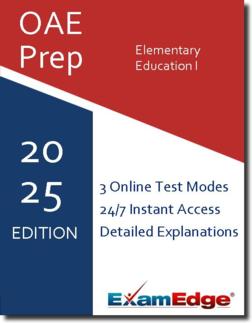OAE Elementary Education I (018) Practice Tests & Test Prep by Exam Edge - Topics
Based on 17 Reviews
- Real Exam Simulation: Timed questions and matching content build comfort for your OAE Elementary Education I test day.
- Instant, 24/7 Access: Web-based OAE Elementary Education Sub Test I practice exams with no software needed.
- Clear Explanations: Step-by-step answers and explanations for your OAE exam to strengthen understanding.
- Boosted Confidence: Reduces anxiety and improves test-taking skills to ace your OAE Elementary Education Sub Test I (018).

Understanding the exact breakdown of the OAE Elementary Education Sub Test I test will help you know what to expect and how to most effectively prepare. The OAE Elementary Education Sub Test I has 75 multiple-choice questions The exam will be broken down into the sections below:
| OAE Elementary Education Sub Test I Exam Blueprint | ||
|---|---|---|
| Domain Name | ||
| Reading and English Language Arts | ||
| Social Studies |


